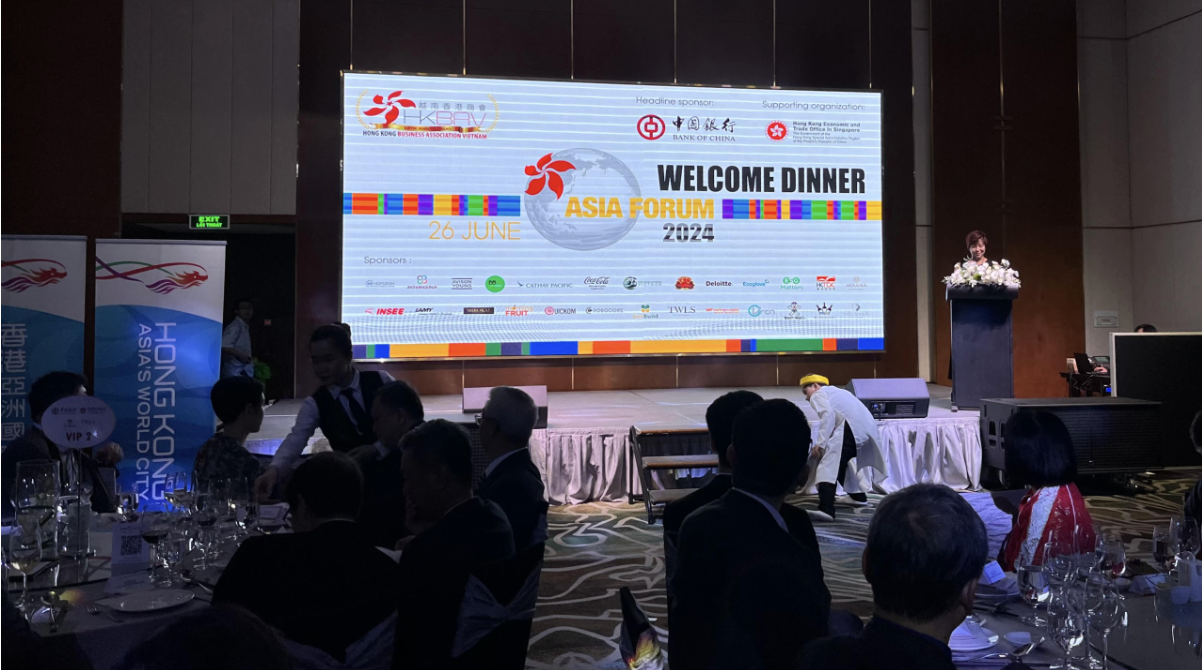Navigating Towards a Sustainable Future:
Key Takeaways from Our Keynote at the Asia Forum

ESG Matters recently had the honour of delivering a keynote speech at the Asia Forum, hosted by the Hong Kong Trade Development Council, the Federation of Hong Kong Business Associations Worldwide, and the Hong Kong Vietnam Business Association. The event brought together business leaders from around the globe to discuss pressing issues of survival and growth in the vibrant host city, Ho Chi Minh City.
Preparing for Future Challenges
One of the central themes of our speech was the concept of "future-fitness." A Future-Fit business ensures that humans and other life can flourish on Earth forever. This vision is achieved by being environmentally restorative, socially just, and economically inclusive.
Environmentally restorative actions go beyond reducing harm—they contribute positively to the environment through renewable energy use and waste minimization. Socially just practices ensure fair treatment, equity, and opportunities for all stakeholders, encompassing fair wages and inclusive workplaces. Economic inclusivity involves creating opportunities that benefit a broad range of stakeholders and support local economies.
Environmentally restorative actions go beyond reducing harm—they contribute positively to the environment through renewable energy use and waste minimization. Socially just practices ensure fair treatment, equity, and opportunities for all stakeholders, encompassing fair wages and inclusive workplaces. Economic inclusivity involves creating opportunities that benefit a broad range of stakeholders and support local economies.
Recognizing Current Challenges
Businesses today face unprecedented challenges, reflected in both socio-economic and environmental trends. Rapid growth in human activities has driven economic development and urbanization, but at significant environmental costs. Alarming increases in carbon dioxide levels, surface temperatures, ocean acidification, and tropical forest loss underscore the urgent need for broader action.
Growing Interest in Sustainable Business
Investor interest in sustainable business activities is growing. Key stakeholders, stock exchanges, and regulators have developed and adopted sustainability and climate disclosure regulations. Today, 71 stock exchanges worldwide have guidance on ESG disclosure, a significant increase from 13 a decade ago.
Navigating ESG Disclosure Requirements
Understanding the climate-related disclosure requirements from frameworks like the SEC Climate Disclosure, ESRS, and ISSB is crucial. Each framework has different scopes, materiality approaches, and assurance requirements, making it essential for businesses to navigate this complex regulatory landscape effectively.
Developing a Future Fit Mindset
To tackle these challenges, businesses need to develop a future fit mindset and create strategies accordingly. System thinking is crucial—focusing efforts on the right areas yields positive impacts, while misdirected efforts yield minimal results.
Work Across the Business: Implement practices that eliminate the risk of causing harm by thoroughly assessing current operations and identifying areas for improvement.
Take Wider Action: Move beyond compliance to take actions that cancel out or reverse negative impacts, such as investing in renewable energy and promoting social equity.
Address Root Causes: Focus on systemic issues and implement solutions that address these root causes, understanding the interconnectedness of various factors.
Greater Systemic Influence: As businesses progress, they gain greater influence and can drive broader systemic changes by advocating for stronger sustainability policies and collaborating with other organizations.
Changing the Mindset on Value Creation
Changing our mindset about value creation is crucial. Traditionally, businesses externalized negative impacts while internalizing financial profits. We need to move to a system value approach, ensuring all actions are positive and reinforcing.
Achieving a Regenerative Business Model
Businesses must adopt break-even goal frameworks to measure and manage sustainability efforts. Achieving these goals ensures businesses do not contribute to environmental degradation or social harm.
Creating Positive Impacts
In addition to breaking even, businesses can create positive impacts by fostering well-being and restoring the environment. This involves both direct actions and collaboration with others to achieve broader positive outcomes.
Positive Pursuits for Future-Fitness
Positive pursuits align with the Sustainable Development Goals (SDGs) and aim to create a broad positive impact on the environment and society. Businesses play a crucial role in this transformation by integrating these pursuits into their operations.
Conclusion
Achieving a sustainable future requires commitment, innovation, and strategic management. By integrating positive pursuits and break-even goals into operations, businesses can drive significant positive change. Each step towards sustainability benefits the environment, communities, and economies.
We encourage organizations to take these insights and start implementing changes today. Engage suppliers, optimize operations, develop sustainable products, and support community initiatives—every action counts.
THIS ARTICLE WAS CREATED BY
ESG Matters
Founded by one of the sustainability pioneers Dr Glenn Frommer, ESG Matters specialises in ESG data analytics, intelligent sensing technologies and sustainability advisory. Since 2014, ESG Matters has been a creator of digital platform solutions to meet the needs of sustainable impact investing and green financing. Working closely with listed companies, SMEs, and various growing organisations, ESG Matters aims to address the global market through providing business process outsourcing (BPO) services and solutions to achieve the relevant sustainable development goals (SDGs) and building resilience to climate change.
To learn more, visit http://www.esgmatters.asia
To learn more, visit http://www.esgmatters.asia

